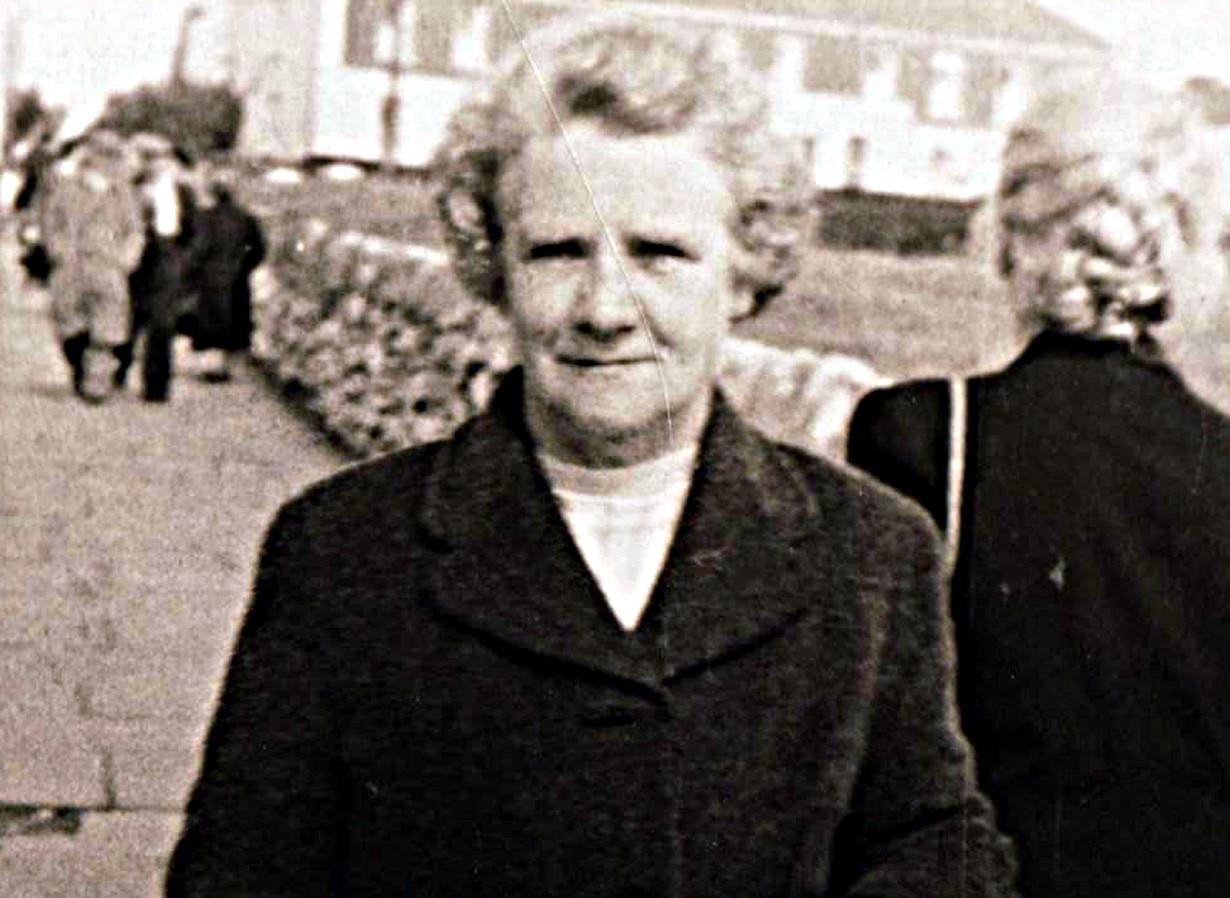Mrs. Lizzie Ryan, Lackareagh (The Glen) in Killaloe, was born in 1900 and passed away in 1996 at the age of 96. She was the oldest person in the area.
She gave this interview at the age of 91 in Raheen Community Hospital.
You can listen to the full interview here through Soundcloud!
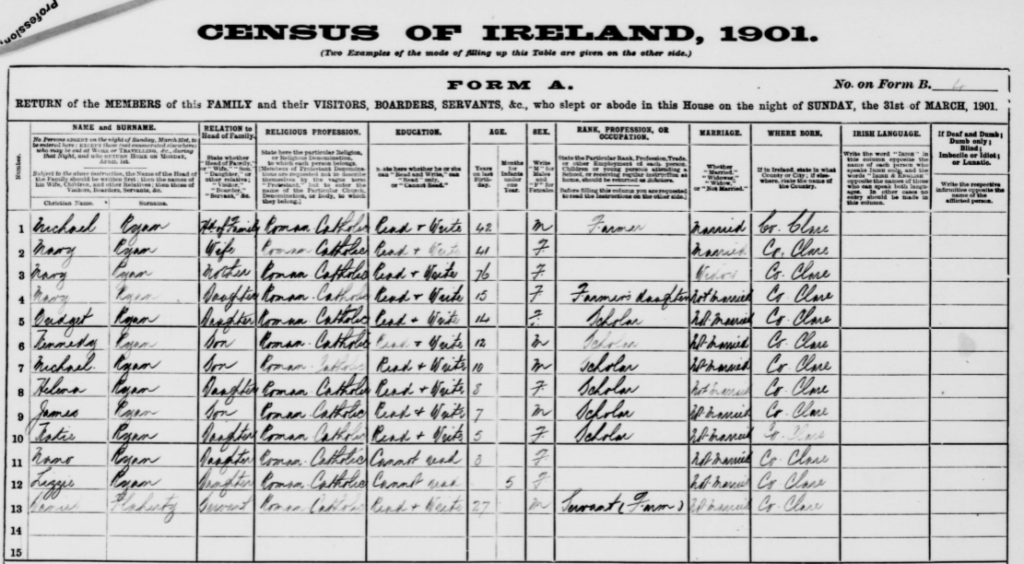
Would you tell me about your relationship with Bishop Ryan, how would you have been related to him?
He wasn’t an uncle, he was an older person. I don’t ever remember I think seeing him long ago, he was Bishop alright, how long he was in Garraunboy or Killaloe I don’t know, but he gave the Convent anyway to the Nuns, and he went up to live in a small house some place around Ennis and he stayed there and he built the College in Ennis, St. Flannan’s, and he built a Chapel also, and I think he built another Private School too. He lived to be a big age, but he never looked for a penny off anyone, anything he got, he never had collections or anything, but it was the people that were generous and good to him; that’s how he got to build the things.
And he put it back into the community? Yes, he wasn’t mean, no.
Do you ever remember meeting him? I never remember meeting him, no.
Where would your Grandfather have been from? Was he also from the Glen?
He was, he was.
So how many generations do your family go back?
I don’t know, five I suppose anyway.
Would you have any idea what your Grandfather would have done for a living? Farming.
And you father? Farming.
And is that the original house now that the family are still in? Would that be your home place? Yes.
That’s where your Grandfather and Father would have been born?
Yes.Well of course we built a new bungalow but the old house is still there, we made a cow-house out of it. That’s where my daughter is living now. Of course, they done away with all the old thatched houses and they built bungalows, but of course some were very poor in them, long ago they hadn’t much at all, they had no luxuries one way or another like we have now.
I remember going to school and we had to cross a river, over to the Glen School and t’was built on our farm and I remember going to school bare-footed for a long time. We used to get shoes I suppose for Sunday, very few could afford them at that time.
And you went to school in the Glen? I went to school in the Glen.
There was a girls school up there?
It a mixed school there, but there was only ten or twelve going.
And what were your teacher’s names?
Mrs Scanlon and Miss Cleary, and there was a Hayes girl from Tulla, no Feakle teaching for a while. Mrs Scanlon was there for a long time but all her family then were coming to that school. But anyway, it’s done away with now; but there is nobody hardly living up there at all, only one woman now with a family, that would be Betty, there is nobody living in the Glen, only two people, they are all gone out of it.
So what age would you have started school in those days? About five, I think.
And what age would you have finished? About fourteen, I suppose….the term.
And when you finished school, what did you do?
I didn’t go anywhere, I stopped, slaving around at home.
So you became a farmer?
Yeah. But a lot of people went to America. Well I remember now, I can barely remember two of my sisters going to America and they never came back. A few of our neighbours’ girls went as well and never came back, they were poor you know, and they couldn’t afford to keep them there, aunts or someone took them out.
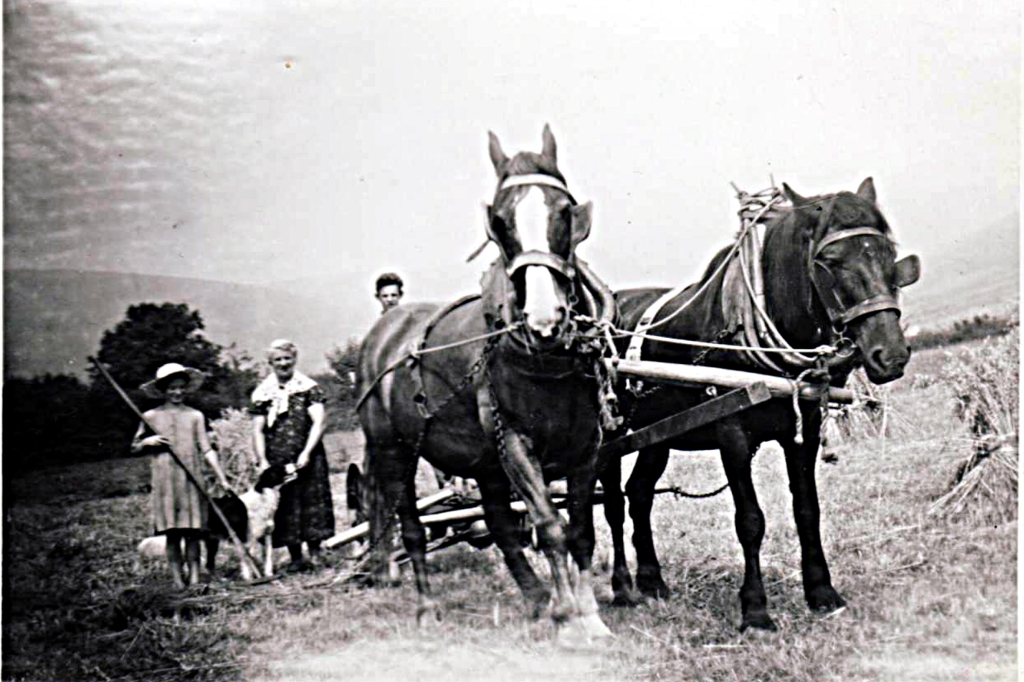
How did they go – by passenger ship? By ship, yes.
It would take a long time? I think a week, or more than a week.
And was there a graveyard in the Glen, where children were buried? There was.
Where exactly is that? Oh God, ‘tis up very far, the Kyle I think they used to call it.
Did you ever know anyone’s families that were buried there? I didn’t.
No names at all?
I don’t know now, I don’t of anyone, cause of course they were all kind of buried on the quiet, any children there was buried there, they were buried on the quiet, it’s only a small little place.
And are there any headstones?
No, no, t’wasn’t big enough anyway for headstones, t’was only a small little patch like.
Was there a Church up there? No, Garraunboy was the nearest to us.
And was there Hedge Schools or anything like that up there? There wasn’t.
And what about Mass Rocks?
There was no Mass Rocks, wait now ‘til I think, Garraunboy was the nearest to us and there’s a graveyard in Garraunboy, outside the Chapel, there’s a graveyard there alright.
Is that still there?
Oh it is, there are people are still buried in it, up to last week there was a funeral in it I think.
Can you remember your Grandparents at all?
I do, I can remember my grandmother, she lived to be a big age, I don’t remember my grandfather.
So, where would your Grandmother have been from? God knows, I don’t know.
Can you remember the house, what it was like when they lived in it? T’was a thatched, very dilapidated, very hard to keep it, pulling and dragging, but they were very warm houses, but they needed a lot of attention, t’was very hard to keep it clean, we used to white-wash the hobs every Saturday night.
So, they did all their cooking on an open fire? They did.
So then, your Mum and Dad lived there? They did.
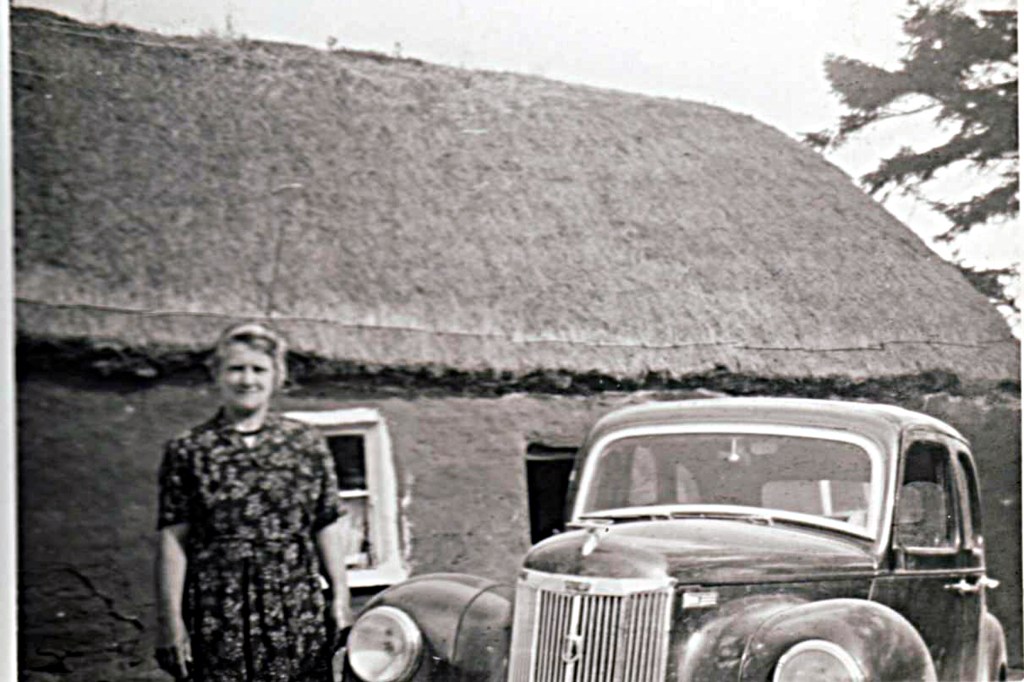
And did they modernise it at all, any bit?
They didn’t, they couldn’t afford to. An amount of people didn’t do anything with their houses around, they were all thatched houses around about.
Do you think it’s a shame that they’re gone now, or is it better?
Oh ‘tis better, they were shook, and a lot of labour got with them, you see you’d have to go for straw, maybe a couple of miles, come back and tease it out and pay a Thatcher.
Have you any idea how much it would have cost? I don’t know now, no.
Would your father bring his animals down to the fair in Killaloe? Yes, yes always.
Did you ever go with him? I didn’t, no.
Even when you got older? No, I didn’t.
I suppose it wasn’t a place for ladies. No.
You’d have no idea how much he would have got for any of his cattle or anything?
No.
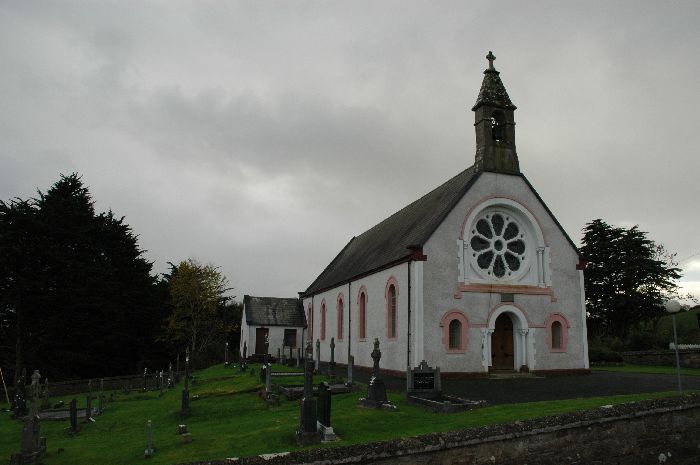
When Garraunboy Church was built, t’was consecrated on such a day and everybody had to go down and I remember my father took me down on his back, I was very small, and he took me down on his back, we couldn’t get into the yard you see, they had wire around it, to keep back the crowd, so I was on his back all day, looking in.
Can you remember what year that was? I don’t, I don’t, no.
You don’t remember how old you were then – you must have been small.
I was I suppose maybe only about two.
And where was the old church, before they built the new one?
T’was very near there, do you know Dillon’s cottage, at the back of that, all Dillon’s sheds are built on it now, you’ll see it when you’re passing. Nobody ever came back to look at it.
And who paid for the building of the new church – where did the funds come from? God knows, I don’t know now, I can’t think.
You can’t remember your family contributing? I suppose they had to. I
can’t think now who built it.
Who would have been the priests – can you remember any of the priests?
No, wait till I think? I can’t think of them.
Even when you were young, can you remember them back to your day, when you were growing up?
There was a Father, oh God, I can’t think of him. He used to come to the school to examine us on the catechism, Father Lawlor, and I think Father O’Dwyer was another. You know there used to be a catechism examination every month and they used to come up and give us a bit of a doing.
To see how well you knew it?
Yeah, yeah. But when we were preparing for confirmation in them times we had to go to Killaloe, down to the church every Saturday, they were teaching us before confirmation, but sure that’s all done away with now, there’s no religion much now like.
So where did the Priests live – the priest that you would have at Garraunboy, did they come up from Killaloe, like they still do? They did, yeah.
So as a girl growing up, you must have gone down to Killaloe – you must have gone down at certain times.
Oh of course. I often went down on the ole ass and car with my mother, to Killaloe when I was small.
What would you go down for? To shop? To shop, yes.
Where would you do your shopping?
Well t’was Crotty’s. Crotty’s isn’t there all the time. McGraths, I think bought it. It changed hands a lot of times.
Can you ever remember who had it then before Crotty’s?
No, no, God Crotty’s had it for a long, long time.
Can you remember any old characters from Killaloe, or any of the old shops in the town?
No, there was a lot of old beggars around mind you, a lot of poor people. They used to come out the country, they used to come to us and we’d be after churning and goodness gracious, you’d see them at the door and they waiting for a cup of buttermilk, they were starving kind of and they’d come every Monday when we’d be churning and my mother used to give them buttermilk and they used to be delighted the craters…
Did you bring your milk down to the Creamery in Killaloe? Or was the Creamery there then?
There was no creamery there, all we had was a couple of goats and maybe two cows and that’s all; that’s all anyone had around us. I remember now Lynch’s near us had five goats and we had three or four.
Did ye milk your goats and use the milk?
Yes, goat milk was grand. T’was yeah. That’s what we lived on.
Did you make the butter from the goat’s milk?
No, from the cow’s then after a while. When we got rich from the goats.
So, you never sent your milk to the Creamery?
No not that time but it’s going now of course. It’s all creamery now. It is.
You say none of the families were wealthy, but you would have had enough? Yeah.
How many were in your family?
I had four brothers and I think about four sisters. There’s two of my sisters are living yet, one in America, one in Limerick, and they’re aged, they must be over ninety.
And what about your brothers? My brothers are all dead.
And where are they all buried? In Garraunboy.
And what did they all do for a living?
They slaved around on the farm, like. None of them emigrated but the girls did.
It wouldn’t have been as easy for the girls to get work? No
Did you ever come down to the dances in Killaloe?
Indeed I did, often come to the Ballina dances in the Creamery.
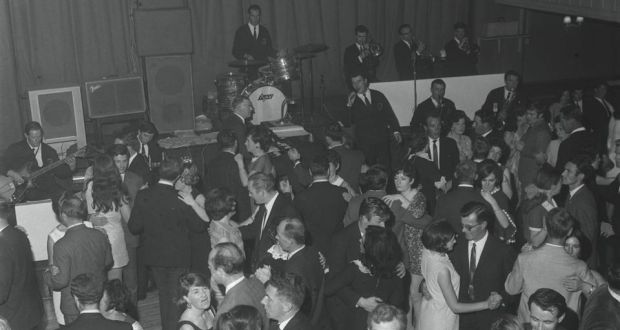
We heard a story about that, t’was called the Cheesehouse – is that right?
Yes, that’s right.
Now, we heard about dances and then we heard that wasn’t true – so you can tell me that’s true.
Oh God there was dances in the ould Creamery, we used to have a great laugh altogether at them.
Who’d be playing at them now?
Some ould Fiddler, I think he lived there in the lane, near the Convent.
In St. John’s Lane? Yes, and he had only one leg.
You don’t know his name?
I can’t think of it now. But he used to have great crack, he used to go every place with the one leg. I think he used to manage an ould bike or something.
Any how often would they have a dance?
Not so often like, because the people hadn’t money to go into it.
And how much would it be to get in?
About four pence or threepence, t’was very cheap to get in.
And where did you meet your husband?
Where did I meet him – at a dance. He’s a Tipperary man.
In Killaloe? Yes.
You’ve a lot drawn out of me now!
Where used you bring the half a sack of flour from?
In Killaloe, from Crotty’s, every week.
By donkey and car?
Yes. There was a lot of us in it at that time. T’would be no good to bring a strum of flour with us crowd, so they used to bring a half sack of flour. Then the flour bags, God forgive me, they used to knock the brand of them, you know, with washing soda and they used to make sheets, they were lovely.
But they wouldn’t do it now!
Did ye grow your own vegetables?
Oh yes, and does still. We’d grow everything we want. We’d five or six drills and everything is in that, potatoes and turnips and everything.
Would your cut your own turf? We cuts our own turf.
Where would you cut it? In the Glen bog.
And did everybody do that?
Everybody dug out ten of them but of course ‘tis the machine that comes and cuts it, then there’s no bother with it, he scatters it and he cuts it, the machine scatters it and then you’d have to go up and turn it after a day or two and then you could bring it home.
And the bog it still there?
The bog is still there, oh ‘tis cause there’d be nine or ten farmers up and the machine will come.
Did you ever milk the goats yourself? Oh God I did; a very hard job to milk the goats.
Were they hard to catch or did you keep them tied up?
No, they weren’t, they were very quiet mind you. But if you wasn’t careful you’d have more than the milk going home!
How far were they from the farm?
Oh God knows they weren’t very far away, they couldn’t be you know when we had to milk them like in the mornings.
Did they ever wander away?
No, very seldom, no. But there’s nare a goat around anywhere now.
And they say goat’s milk is better for you than cows.
Oh, indeed it is, it is. Well they make out that it’s healthier than the cow’s milk at the present. The cow’s milk, you know, there’s a lot in it.
What can you remember about the time of the Black and Tans?
They came to our house one morning. My brothers was all on the run and they came to our house one morning, I remember it well and they searched the house and we had a loft you know and t’was a ladder going up to the loft, like in old times in the thatched houses they hadn’t any upstairs, and they went up and pulled the ould tick asunder and prodded and plucked and you’d see feathers going in all directions. They blackguarded the devil out of us but sure we sent them away anyway, but we were in dread of our lives that they’d come on, there was a few of the men down in an ould house of ours down in the fields far away, and we were afraid of our lives they’d go down and catch them, but they didn’t, they went away peacefully after searching the house.
And was it only once they did that?
Only once, but we were all the time afraid of them. They frightened us.
Can you remember want it was like in Killaloe? I don’t remember, no.
And can you remember the executions on the bridge?
Oh God yes, I remember them because I was going to the Creamery with the pony and car one morning and I saw all the blood on the bridge, and I was wondering what it was all about, I thought it was somebody that maybe fell naturally and didn’t rise up in a hurry or something. And t’was there anyway and t’was there all the time, and I coming back the blood was all around the bridge.
And t’was afterwards I heard about them, they were brutally shot there.
And sure someone there now in the village puts an ould wreath on it, they done it last week, I think, I saw in the paper, t’was sad.
You didn’t know the men?
No, McMahon, Egan, Gildea and another name, I didn’t know them, no.
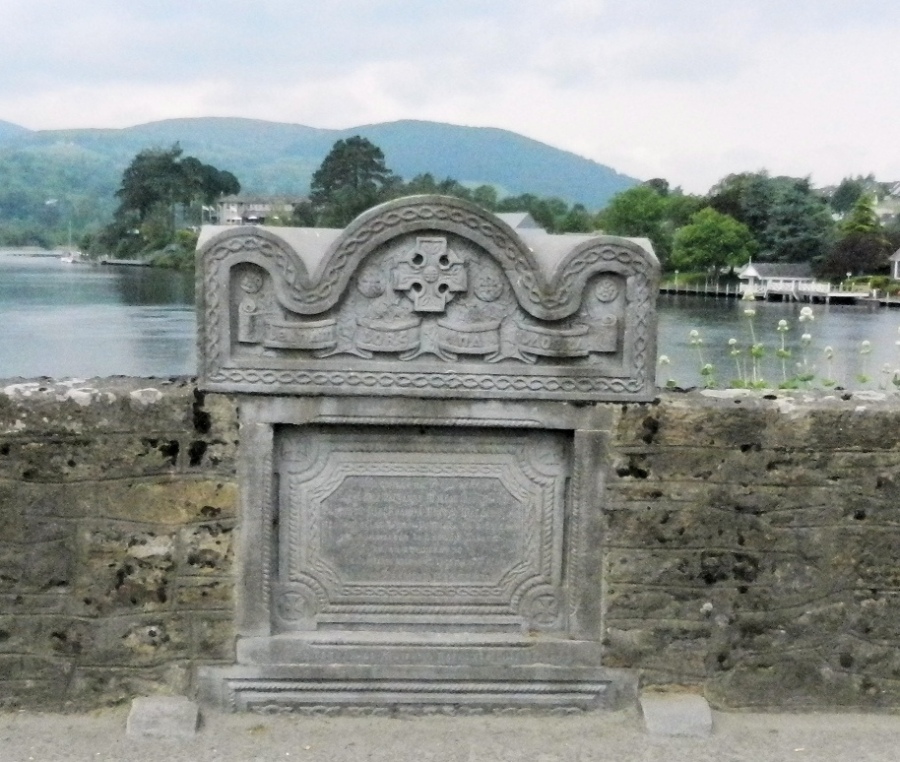
They were from Scarriff!
They were, up that way. They went up in a boat whoever took them up, someone spied on them of course, devils, they went up in a boat to Williamstown, someone went up in a boat and brought them down.
We’ve heard different stories – that after they shot them, they took them to the Lakeside and held them there. We also heard that they took them up to the Barracks. They did, they did, they blackguarded them, they did. Oh, indeed they did.
And they didn’t release them to their families? No, no. T’was a terrible time.
Some of the boys went down, a brother of mine went down and a boy of the Lynch’s.
And he (?) used to teach Latin?
He used to teach Latin over in Ballina, over where the Gooser’s is now.
In Murphy’s Pub in Ballina – that’s where they taught Latin. Was it a proper school or just part-time?
Oh, t’was only part-time, I think. They used to go down for a few hours, I think.
That would have been private – they would have had to pay for it?
No, I don’t think they had to pay for it.


